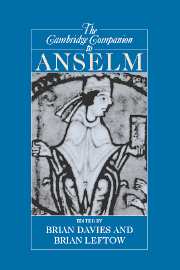Book contents
- Frontmatter
- Introduction
- 1 Anselm’s life, works, and immediate influence
- 2 Anselm on faith and reason
- 3 Anselm, Augustine, and Platonism
- 4 Anselm’s philosophy of language
- 5 Anselm on modality
- 6 Anselm’s perfect-being theology
- 7 Anselm and the ontological argument
- 8 Anselm’s account of freedom
- 9 Anselm on truth
- 10 Anselm on ethics
- 11 Anselm on the Trinity
- 12 Anselm on atonement
- Bibliography
- Index
1 - Anselm’s life, works, and immediate influence
Published online by Cambridge University Press: 28 May 2006
- Frontmatter
- Introduction
- 1 Anselm’s life, works, and immediate influence
- 2 Anselm on faith and reason
- 3 Anselm, Augustine, and Platonism
- 4 Anselm’s philosophy of language
- 5 Anselm on modality
- 6 Anselm’s perfect-being theology
- 7 Anselm and the ontological argument
- 8 Anselm’s account of freedom
- 9 Anselm on truth
- 10 Anselm on ethics
- 11 Anselm on the Trinity
- 12 Anselm on atonement
- Bibliography
- Index
Summary
A book like this has to give a picture not only of the modern philosophical and theological interest of its subject's writings, but of the context in which he wrote. For a writer whose works have been the subject of debate for nearly a millennium, there is the additional task of seeking to convey the changing nuances of expectation with which he was read century by century. All this is of more than historical importance. To discuss in translation the thought of someone who chose his words very carefully in Latin is not necessarily to discuss exactly what he wrote. And to analyze ideas out of context is to discuss matters which, while they may be of high philosophical interest in themselves, may also not be exactly the topics or the solutions Anselm had in mind.
Anselm of Bec and Canterbury is read as a thinker in his own right and not merely as a prominent exponent of a mode of thought belonging to a particular period period of medieval thought. Nevertheless, he was in a number of respects a man of his time and the thought itself was conditioned by personal and historical circumstances which need to be understood if his ideas are to be interpreted with sensitivity to what preoccupied him and what he meant to say. This chapter is biographical and historical; it seeks to provide a brief but necessary context and to encourage the reader to consider in this light the “Anselmian” complexion of the topics covered in other chapters.
- Type
- Chapter
- Information
- The Cambridge Companion to Anselm , pp. 5 - 31Publisher: Cambridge University PressPrint publication year: 2004
- 1
- Cited by



